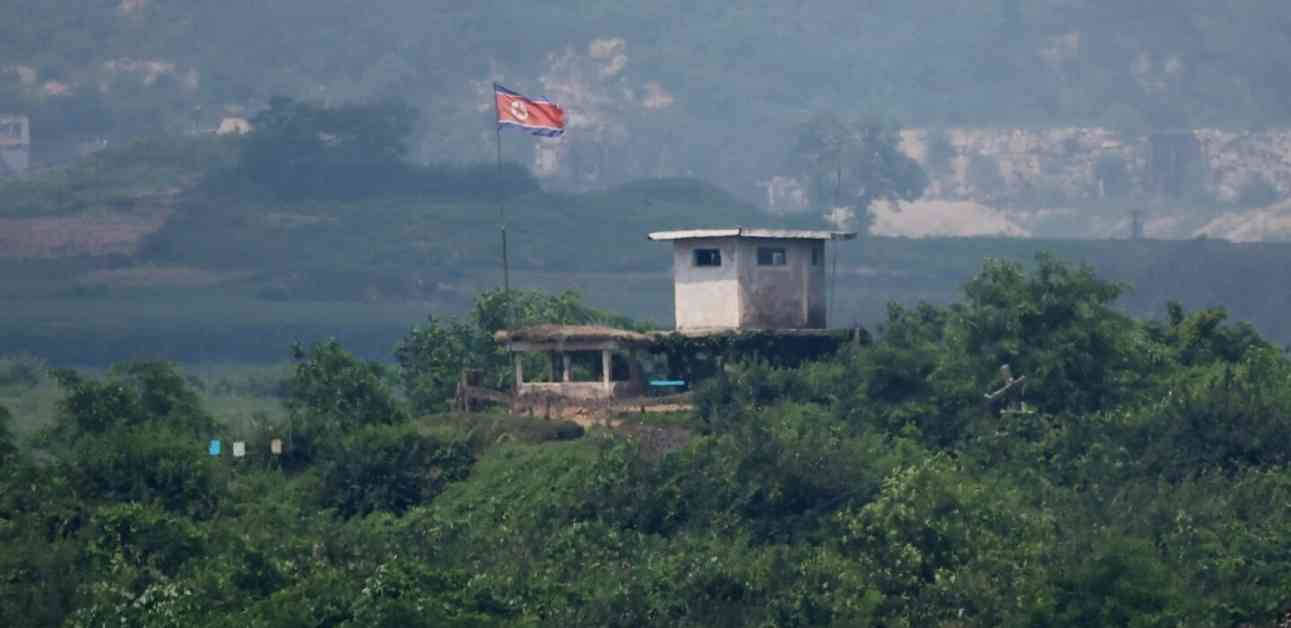North Korean Soldiers Cross South Korean Border Briefly
Soldiers from North Korea who were working inside the DMZ on the central front briefly crossed the military demarcation line, said the South Korean Joint Chiefs of Staff (JCS) in a statement. The DMZ refers to the demilitarized zone that has separated the two enemy states since 1953. “After our army broadcasted warning messages and fired warning shots, they retreated to the north,” the statement continued. “Apart from the immediate retreat of the North Korean soldiers after our warning shots, no unusual movements were observed,” they added.
Accidental incursion? Both the North and South Korean sides of the DMZ, which is 4 km wide, are heavily fortified. However, the actual demarcation line, located in the middle of the zone, is only marked by simple signs every 100 meters that have not been replaced in over 70 years. Soldiers from both sides regularly patrol inside the DMZ, sometimes leading to clashes.
According to the JCS spokesperson, it was likely an accidental incursion. “The situation that day was that the DMZ was overgrown with vegetation, and the marking of the military demarcation line was not clearly visible,” he explained to the press. The North Korean soldiers “were moving through the bushes, and we were observing them even before they approached the demarcation line,” he continued. “We believe they had no intention of invading, as they immediately retreated to the north after the warning messages and shots.”
“Small provocation.” The incident on Sunday occurred as relations between North and South Korea are among the most tense in years. The two countries technically remain at war, as the conflict from 1950 to 1953 ended in an armistice, not a peace treaty. Sunday’s incursion could be a “small provocation” aimed at testing the South Korean military, suggested Ahn Chan-il, a former defector who heads the World Institute for North Korean Studies. “It could also be part of the preparations for what Kim Yo Jong described as ‘new countermeasures’ against the South,” Ahn told AFP, referring to Kim Jong-un’s sister and chief spokesperson for the North Korean regime.
Pyongyang has recently innovated its methods of provoking Seoul by sending hundreds of balloons filled with garbage like cigarette butts, toilet paper, and even animal excrement to South Korea. The North Korean regime intends to retaliate against the sending of hostile leaflets by defector groups to the north, also by balloon, containing criticisms of leader Kim Jong-un and his family, small denomination dollars, and USB drives containing K-pop and South Korean series. Seoul is legally unable to prevent these deliveries.
In early June, the South Korean government completely suspended a military agreement reached in 2018 to reduce tensions and resumed broadcasting propaganda through loudspeakers along the border in response to the garbage balloons. North Korea, which had already discarded the 2018 agreement last year, warned Seoul of “a new crisis.”
According to the South Korean military, the North is currently installing loudspeakers on its side of the border, indicating intense duels of blaring propaganda. These sound duels were common since the 1960s but had been suspended in 2018 during a warming of relations. The decision to abandon the 2018 agreement and reconnect the loudspeakers could have serious consequences, based on past events.
Complaining about the propaganda leaflets sent against its regime from the South, North Korea in 2020 cut all official military and political communication links with its neighbor and blew up an inter-Korean liaison office located on its side of the border. The North has also threatened in the past to fire on the South Korean loudspeakers if the sound was not turned off. The abandonment of the 2018 agreement also means that the South Korean army can resume live-fire exercises near the border. This agreement was the result of an inter-Korean rapprochement promoted by the former South Korean President Moon Jae-in, who had met with Kim Jong-un several times.
In 2020, the South Korean parliament passed a law prohibiting the sending of propaganda leaflets to the North. However, the Constitutional Court invalidated the law last year, ruling that it violated freedom of expression.





















